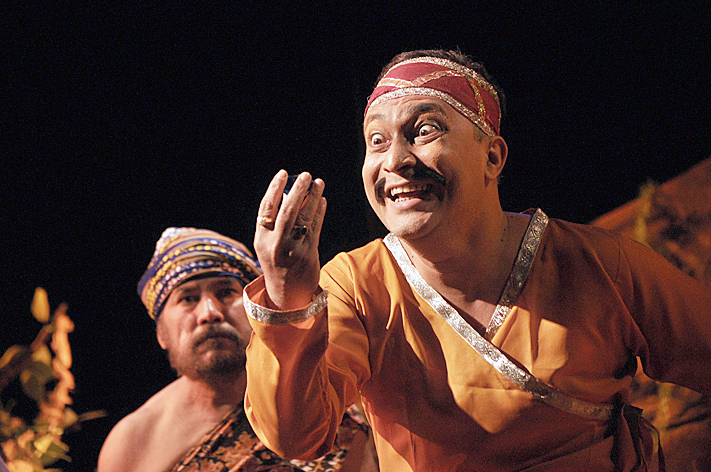The fifth edition of the National Theatre Festival (February 16-23) hosted by Minerva Natya Sanskriti Charcha Kendra — a wing of the Department of Information and Cultural Affairs, Government of West Bengal — presented a fairly balanced view of contemporary proscenium theatre as practiced in various corners of India. At least, it seemed so. For no reviewer can humanly catch all the shows being staged simultaneously at Minerva Theatre, Rabindra Sadan and Madhusudan Mancha — with a good 12 km and a congested evening traffic thrown in between the former and the latter.
Among the outstation productions, a mounting interest to assert the identity question could be sensed. Ranchi-based Yuva Rangmanch’s Ulgulan revisited the Santhals’ age-old struggles with the prevailing power structure. Written and directed by veteran Ajay Malkani, this 80-minute work lacked finesse but the manner in which the actors’ cultural bodies responded to the discourse grabbed attention. Indigenous folklores formed the basis of Agartala-based Natyabhumi Group Theatre’s Waksaa (Piglet). Essentially a reworking of a transformation myth set in royalty-ruled Tripura, this rigorously worked out drama presented agrarian rituals in life-like authenticity as the actors sang and danced in measured moves. The playwright-cum-director, Partha Pratim Acharya, must be lauded for crafting a seamless translation of primitive life into the language of modern theatre. Seventy minutes of unalloyed joy, one must say.
Wish we could say the same about two other works from the Northeast, namely Hojang Taret by The Umbilical Theatre (Manipur) and Crownless Prince by Replica (Assam) — both adaptations of Western classics. The latter was an abridged adaptation of Hamlet — visually arresting but lacking intensity. Nonetheless, young director, Bhaskar Boruah, looks poised for greater heights. The former, an adaptation of Euripedes’ The Phoenician Women found the director, Oasis Soungaijam, exploring digital projections and rehearsed moves — all at the cost of the play proper. Absence of subtitles made it a futile experience, which is a pity, considering the Calcutta audience’s acquaintance with classical Greek drama. Andha Yug (Gujarati) presented by the Department of Dramatics, M.S. University, Vadodara — a surprising entry — not only succeeded in addressing the key concerns of the Dharamvir Bharati classic, but also appropriated it terms of the performative lexicons of Gujarat, not to mention the colourful costumes. Use of Dhola Maru elements and fluid acrobatics made this Chavan Pramod R. adaptation a delightful watch. New Delhi-based The Trialogue Company turned heads with Tansen, a stunning musical journey into the life and times of the Hindustani musical legend. Sudheer Rikhari, the supremely talented director-actor, should get repeated invites from this city.
This festival also marked the return of two contemporary masters to Calcutta. Mohit Takalkar’s ability to churn gripping moments using minimalist means made Aasakta’s Chaheta a riveting show. This year-old production — based on Shirin Bismillah’s Hindustani translation of The Beloved, a deft reworking of Abraham’s sacrifice myth by the Palestinian author, Amir Nizar Zuabi — is a cross-cultural effort exploring primordial instincts. Takalkar did away with the set and kept returning to the chalk circle imagery to create an immersive space in no time. With the background score down to bare essentials and the lights heightening the moments rather than the mood, it was left to the seasoned quartet of Takalkar, Rasika Agashe, Sagar Deshmukh and Neha Joshi to come up with a jaw-dropping performance. However, Makarand Deshpande’s self-indulgent critique of Hindutva politics in Ansh Theatre Group’s Ram failed to impress. Deshpande’s clever use of Ramleela scenes to lampoon the sycophants and strategic positioning of a good lawkeeper (Nagesh Bhonsle) saved an otherwise timely effort underlined by moments of brilliance.











